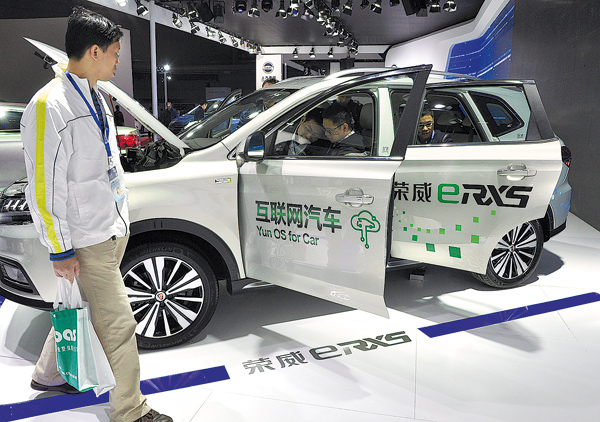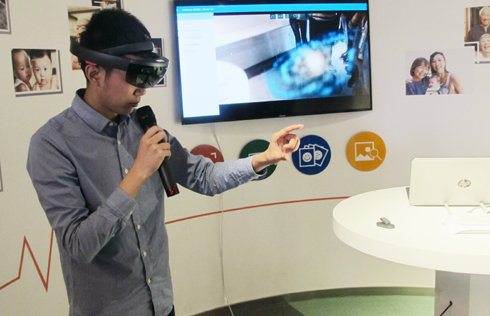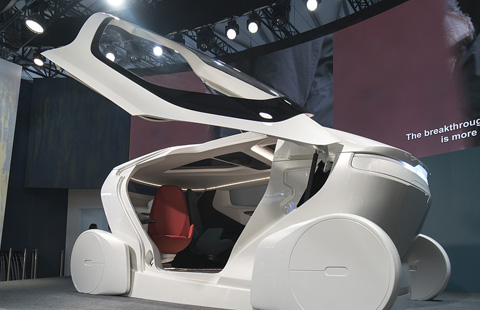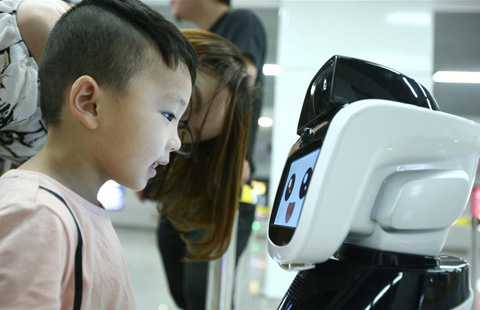Young customers gravitate toward online, virtual shopping experiences
 |
|
An internet-connected model, the Roewe RX5, catches visitors' eyes at an expo in Shanghai. ZHOU DONGCHAO / FOR CHINA DAILY |
To surf online for preferred auto brands and products, then visit a showroom for a seamless experience and finalize the purchase, is among visionaries' future prospects for young Chinese customers.
Industrial insiders have long predicted that the digitized sales process will evolve to disrupt the business of today's auto dealerships.
The future of car purchasing is a digitally-driven approach that starts at home and continues at the dealership, with final delivery options including home delivery, according to a recent study by Accenture Consulting.
The evolution is driven by Chinese youth born around the year 2000 and now seeking a rewarding, in-person experience at the dealership.
"A dealer could lose a large portion of potential customers if not attracting and gathering them on the internet. The next step will be accepting individualized orders online," said Shen Jun, managing director of Accenture Consulting Greater China.
The consulting firm's research found that less than a quarter of Chinese respondents born around the year 2000 rank standard dealerships as their preferred option, while about 40 percent of them favor flagship stores.
Chen Haifeng, an official of China Automotive Technology and Research Center, agreed that online and offline sales channels will eventually converge.
"Technologies including augmented reality, virtual reality, big data and cloud computing will bring the sales model into the next phase in the future," he said.
It is believed that the younger customers will engage in an immersive experience-from configuring a new car using augmented reality and facial recognition at the dealership to interacting with a virtual assistant and a connected workshop.
Millennials are already accustomed to such experiences in gaming. When it comes to buying cars, they expect a dealership to integrate their digital and online experiences with the fabric of their lives.
Shao Jingning, CEO of an online sales service provider Xingyuan Auto, saw the necessity in building new business systems for traditional dealers.
"The auto dealers have run into obstacles in the traditional business models, and are in need of higher efficiency and lower costs in selling their products," he said.
"The consumption, from intent to purchase, will be based on the mobile internet. As a result, future sales people should be capable of closing the deal through these new, emerging approaches," Shao continued.
The young customers could get frustrated if they experience a disconnect between their online experience and the physical experience at the dealership, according to Accenture's Shen.
"Sales associates could be armed with collaborative digital tools to help bridge the gap, then function as the product geniuses their younger customers seek," Shen said.
The automobile industry has realized that younger generations tend to express themselves, and their preference is for flexibility.
Carmakers and dealers should consider providing smartphone apps that enable Chinese youth to see full-scale virtual versions of vehicles that interest them using augmented reality, save their preferences and send them to local dealerships in advance, according to Accenture.
Shen noted that: "authentic, high-quality experiences that recognize the customers' desire for personalization, convenience and control will be critical components of success.
"And a digitally supercharged sales process could help turn today's reluctant buyers into tomorrow's devoted customers."
Among the automakers tapping the internet's potential, Changan Automobile has already launched its Changan Cloud Shop in April.
Ren Zhe, general manager of the State-owned carmaker's e-commerce center, said:"It's inevitable for Changan to pave the way through online e-commerce. It empowers the dealers at first, then connects the carmaker directly with the end users. Finally, it will fully utilize the users' data, possibly the really valuable assets in the future."



















